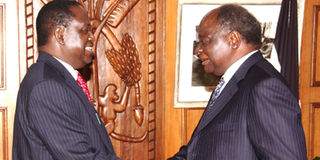Of political debts and betrayals and the politics of back-stabbing

Prime Minister Raila Odinga and President Mwai Kibaki. In Kenya, political pacts have as much staying power as a gob of spit. Nobody honours them. PHOTO | FILE | NMG
What you need to know:
Uhuru is so far the most startling incarnation of this political debt business.
He fooled everybody, with his campaign talk of a Jubilee combo extending to 2032.
It tells a story of a man who was all along playing mind games with a Tanga Tanga crowd that imagined they owned him.
In Kenya, political pacts have as much staying power as a gob of spit. Nobody honours them.
The other day I got to listen on YouTube to Kimani wa Turacco’s controversial vernacular hit song Kitaeleweka, which has gotten everybody's nose out of joint. Basically, its message is that Central Kenya has no political debt to pay anybody come 2022. A handful of excitable Central Kenya MPs who are in the so-called Tanga Tanga squad have furiously condemned the song. It reminds me of the wave of clandestine vernacular cassette recordings that suddenly materialised in Nairobi's River Road at the time Mr Kenneth Matiba was being arrested for his multi-party campaign in 1990.
I recall the then Kanu songbird, Joseph Kamotho, hilariously telling the world the cassettes were the work of street boys high on dope. Dope or no dope, these underground musicians are better wired to the mood on the ground than their clueless politicians.
BITTER RESIGNATION
The politics of debts in modern Kenya must start with Jaramogi Oginga Odinga, who stuck his neck out to demand Jomo Kenyatta's release from colonial prison. No other elected African politician had the guts to say what Jaramogi defiantly stated in the colonial Legislative Council. In fact, they sought to minimise what he had said, pleading that Jaramogi was not speaking for the African cause, which he was.
There is a story to the effect that Britain had offered Jaramogi the leadership of the country in the build-up to Independence. It's a myth, but with a very wide circulation. The Brits were dead set against Jaramogi for ideological reasons. Besides, the Kanu leader at the time was James Gichuru, with Jaramogi as deputy. When Gichuru relinquished the leadership to Jomo and Kanu went on to win the final pre-Independence election, Jomo was obligated to appoint Jaramogi as his Number Two. That, however, does not erase the series of betrayals Jaramogi was subsequently subjected to by Jomo's inner circle, culminating in his bitter resignation from Kanu in 1966.
SYSTEMATICALLY SIDELINED
Enter Moi in 1978. The man most responsible for his ascension to the throne was Charles Njonjo. Moi repaid the arrogant and quite misguided Njonjo with a commission of inquiry which turned him into a non-person. Moi was not somebody who held much store for loyalty. Remember his nasty treatment of George Saitoti, who had served him loyally before he was told – in a very public and shocking way – that he was not fit to lead? Before him as vice-president came Mwai Kibaki, who Moi distrusted and disliked and whose Central Kenya constituency was systematically sidelined from power. For anybody seeking to understand the deeper anxieties of Kitaeleweka enthusiasts, it is their experience of that Nyayo period that breeds their phobia of a Tanga Tanga enthronement in 2022. Once bitten, twice shy.
Kibaki was no angel, either. He continued the ways of not repaying political debts upon getting power in 2002. First it was to Raila Odinga, who expected the premiership and a share of power. As fate would have it, he later got exactly that in 2008 after a violent post-election period where Kibaki had been pushed to the wall. Further to understand Kitaeleweka, Raila is absolved for the mayhem in the Rift Valley during that time, with the blame placed on the masterminds of Tanga Tanga movement. Still, Raila got no endorsement from Kibaki in 2013, for which it must be said Raila's own manoeuvrings since the 2002 coalition and when he became PM greatly contributed to.
TRAGIC EVENTS
Then came the Kalonzo Musyoka betrayal. Ukambani's politics ever since has hinged on that, where Kalonzo, who Kibaki had appointed as his vice-president in 2008, assumed he would get the nod from his boss.
Kibaki and his circle know best why they never endorsed Kalonzo, though I suspect their decision was not too difficult to make, knowing the kind of person they had on their hands. Certainly it was not because of Uhuru Kenyatta's candidacy, which Kibaki's men (and kin) tried to initially discourage.
The big debt now is presumably for 2022, which Kitaeleweka is all about. The tragic events of 2007/2008 loom large, and nobody has ever owned up for them. Turacco’s song specifically remembers the Kiambaa Church atrocity, which remains a festering wound to this day in a way the Tanga Tanga crowd has never quite comprehended.
SAFELY RE-ELECTED
Uhuru is so far the most startling incarnation of this political debt business. He has run three successful presidential campaigns (2013 and two in 2017) – under cover. Under cover? Yes. Because his principal coalition allies never seemed to have figured him out. He fooled everybody, with his campaign talk of a Jubilee combo extending to 2032. The manner he has been knocking down the Tanga Tanga mob after he was safely re-elected last year is an eye-opener. It tells a story of a man who was all along playing mind games with a Tanga Tanga crowd that imagined they owned him. Amazing.
Let’s wait and see what will come out of the “Handshake.”





